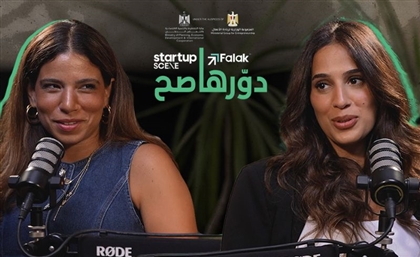Is Podcasting a Pandemic-Proof Industry? An Interview with Kerning Cultures’ Hebah Fisher
The Middle East’s first venture-backed podcast network, Kerning Cultures is having its moment in the sun with a huge spike in listeners, despite global podcast statistics taking a tumble. We speak to Co-Founder and CEO Hebah Fisher to find out how their content production model bucks the trend.
Just as the reality of the COVID-19 pandemic began to set in, and businesses, startups and freelancers alike set up their work-from-home offices and started to fret about their futures, Dubai-based podcasting network Kerning Cultures revealed that their latest series had topped the charts in 10 MENA region countries. “Whenever we launch a new show, it’s like launching a new business; it takes time for the audience to grow, so we were expecting a dip in our numbers,” says Hebah Fisher, Co-Founder and CEO of Kerning Cultures. “But our numbers grew 70%!”
As more and more people have extra time on their hands, practising social distancing and staying home for the majority of their day, it’s perhaps no surprise that evergreen, streamable content is truly having its moment in the sun. Netflix has reported a 142% growth in interest, and binge-watching of series on HBO Now is up 65%. However, with less commuting and going to the gym, and more consumption of hard news globally during government-enforced lockdowns, audio content seems to be down across the world. In fact, during the same week that Kerning Cultures topped the Apple Podcast charts, Spotify revealed an 11.4% drop in music streaming and over all, podcast downloads dropped around 10%, while total unique listeners were down 20%.
So how did this MENA podcast startup manage to buck the trend so considerably? “I think we’re hitting a place in our business where we’re starting to get that network effect across our shows, so there’s that element,” says Fisher. “The other element is that, of course, our content is awesome!” Their chart-topping B’Hob series, released in March, explores interesting and always non-typical love stories from across the region (“It’s not a fluffy love show!” she swears). The Arabic language show delves into the lives and times of each episode’s protagonists at an almost-granular level, pulling listeners in for about 20 minutes at a time. “I think another part of it is truly that people are stuck at home. We have a lot of listeners tagging us on social media posts, showing themselves listening to B’Hob while doing puzzles, or going for a walk... It’s great."
Speaking to us from Seattle, working remotely with the rest of the Kerning Cultures team is not new for Fisher. “There’s 12 of us across nine cities, in six countries – which is crazy unto itself. But it means that we’re used to working at a distance. What’s really changed [during the Coronavirus pandemic] is interviews,” she explains. Human stories and in-depth interviews are perhaps the key ingredients in Kerning Culture’s editorial success; they’re what make their episodes so gripping, relateable and immersive. “We strive to always do our interviews in person, and if we’re not able to physically go to a guest, we send a local producer to record so we can get high quality audio... Now that’s totally out of the question,” she says. “Now, we’re sending low-cost, easy-to-use recorders in the mail and asking the guest to record their side of the conversation while we talk to them over video conferencing software. But some guests are refusing because they don’t want to receive packages; they’re afraid of them. In those cases, we have to resort to recording interviews over the phone, which is not the best quality.”
Though Kerning Cultures pre-Coronavirus setup is well positioned to allow them to continue to produce content - despite potential loss of audio quality - they’re also able to rely on their existing content production model to put out programming... At least for a few more months. “Because it’s evergreen content, we’re able to produce in advance so we have a significant buffer in our production pipeline. But come summer... I don’t know. Maybe all of our shows will sound like this,” Fisher explains, with a laugh, referring to the poor quality of audio on our Zoom call, as we speak with an eight-hour time difference.
Their agile setup and ability to produce their content with a variety of tools has also helped the Kerning Cultures team to produce timely episodes in the last few weeks. “We’ve released a few specials, such as ‘Lockdown Diaries’ which showcases the creativity that’s been born out of Coronavirus, and we’ve invited listeners to send in voicenotes, chronicling their experiences in lockdown. We’re also doing something similar for B’Hob where we look into how relationships have changed in these times,” explains Fisher, adding that all of their shows have seen an increase of subscribers in the last month or so.
“We’re fortunate that media is one of the spaces that seems to be protected from the ongoing crisis, because the only source of entertainment is what we create ourselves or that someone has created for us to stream,” she says, referencing the huge spikes in streaming globally. “On the other hand, it’s an extremely stressful time for everyone, so just surviving it is enough. I think the world is going to look very different when we come out of this. A lot of industries are dying, so many businesses are not going to survive this.”
On the business side of Kerning Cultures, they too are not totally immune to the financial implications of the current crisis. “It has been a lot harder from a commercial standpoint. We’ve had a number of deals that have been shifted to the summer which has been difficult. Fortunately, our business model has had venture funding, so we have somewhat of a buffer that a lot of companies don’t,” explains Fisher. “But we have taken a hit and I hope that it will correct itself when we come out of this. We’re trying to persuade advertisers to keep going, especially that, globally, podcast listening is down about 10-15% but our case is unique in that we’ve grown. So we’re positioning this as an opportunity for brands – like, your event got cancelled, why not connect with your audience through an amazing story that we can produce for you?”
Through the global changes in content consumption and the shifting interests, however, Kerning Cultures plans to stick to their editorial line. While more and more people tune into current affairs and news programming to keep abreast of the crisis, Hebah Fisher and the rest of the team will keep doing what they do best. “I think there’s enough news. And I know a lot of people are sick of the news cycle. We need other content to nurture our souls. And that’s why Kerning Cultures was born.”
Photography by @MO4Network's #MO4Productions






















